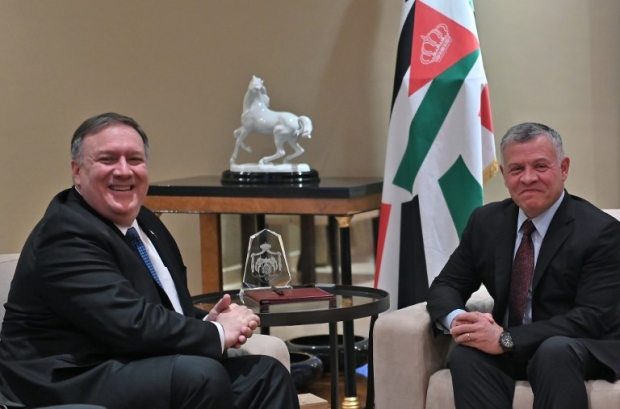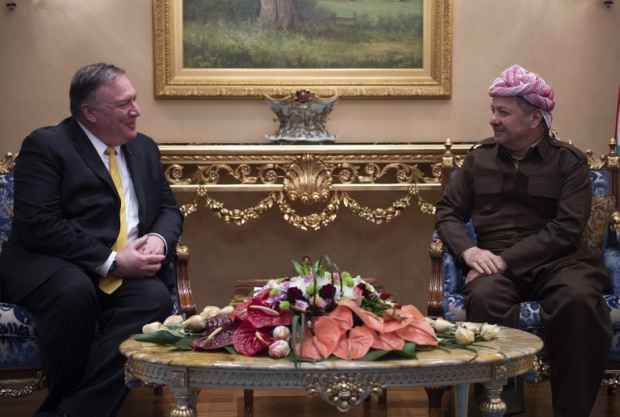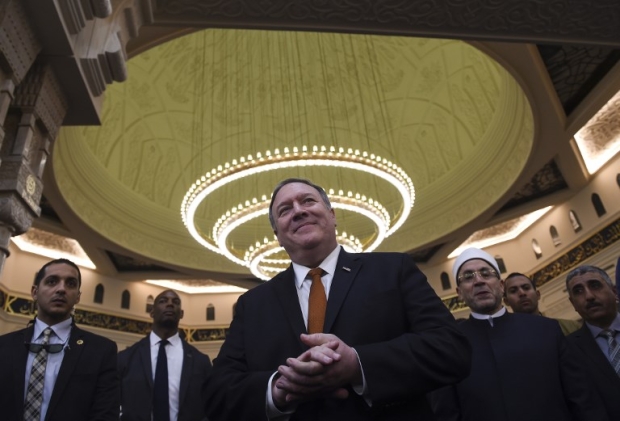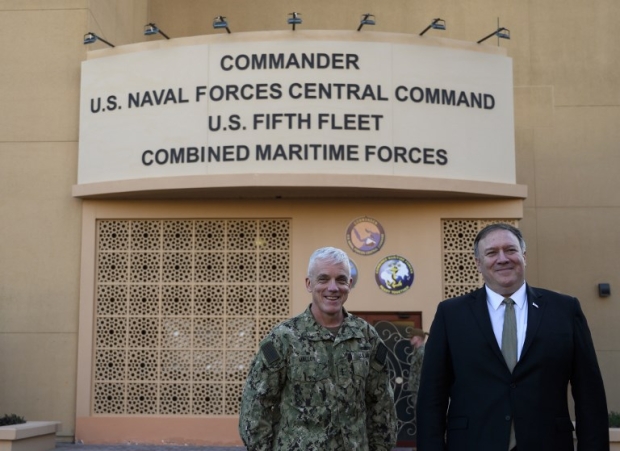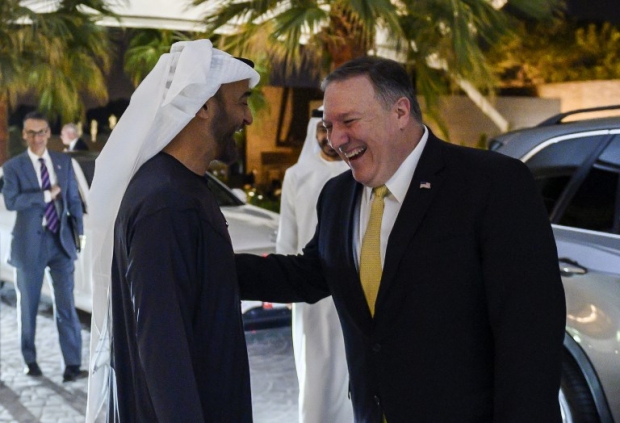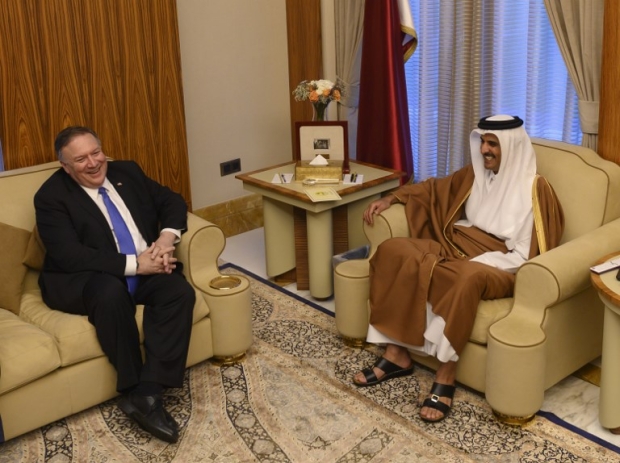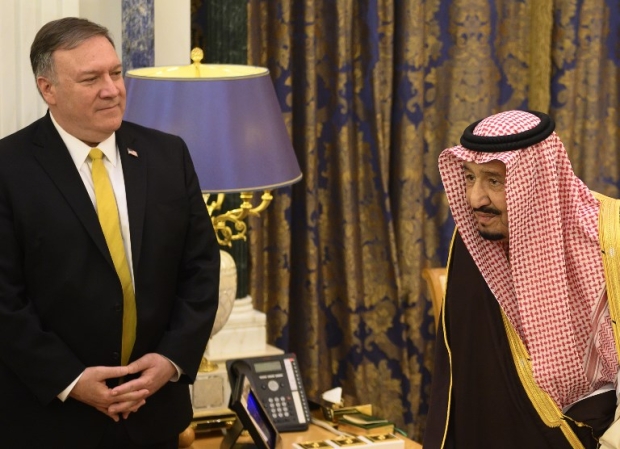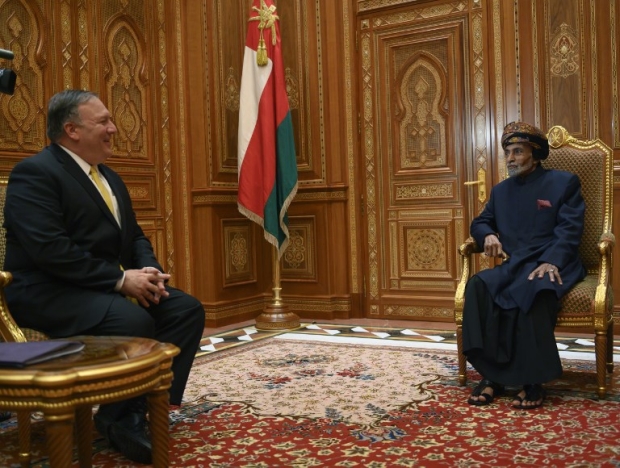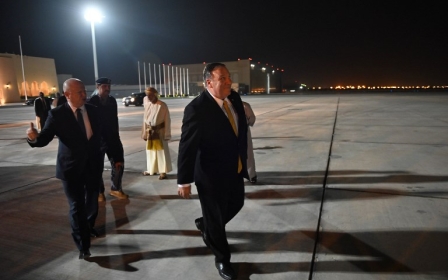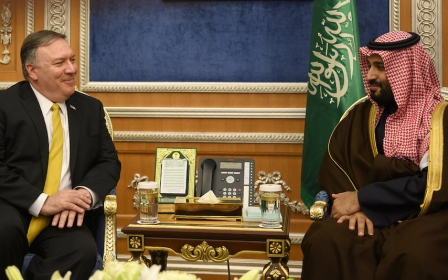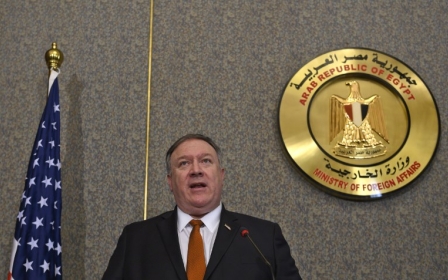Pompeo on tour: What the US secretary of state pledged during his Middle East trip
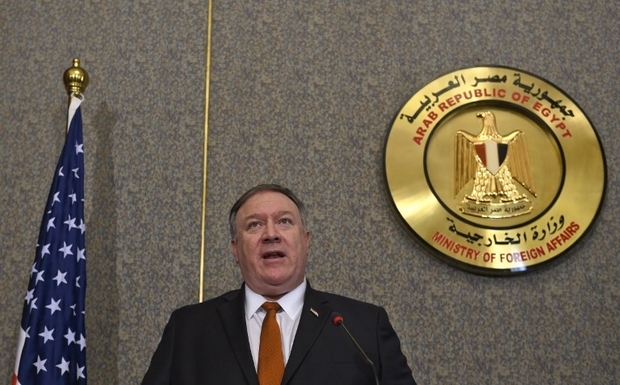
Mike Pompeo has left the Middle East after a seven-day tour that saw the US Secretary of State repeatedly attack Iran and denounce Obama-era policies, all while attempting to reassure Washington's regional allies over Donald Trump's decision to withdraw US forces from Syria.
While US-based analysts said Pompeo's trip largely failed to provide concrete information about the direction of the Trump administration's policies in the region, that didn't stop the senior United States official from making headlines as he visited several countries.
With stops in Jordan, Iraq, Egypt and Saudi Arabia, among other places, Pompeo met with key leaders to discuss pressing issues on the US agenda, particularly the influence of Iran and continued US engagement in the region.
He also met with Saudi Arabia's King Salman and the kingdom's powerful crown prince, Mohammed bin Salman, who has been under heightened international criticism since the murder of journalist Jamal Khashoggi in October.
Here's a look at what the US secretary of state said during his visits, and how Pompeo's comments were received by observers and others in the region.
Amman, Jordan - 8 January
Speaking in the Jordanian capital, Amman, Pompeo reasserted that the US was “redoubling” its diplomatic and economic efforts to counter Tehran’s “malign influence” in the region.
Pompeo said the US was still committed to defeating the Islamic State (IS) group, but said Washington's "tactics have changed, not the mission".
Trump's decision to pull US troops out of Syria has been panned by critics accusing Washington of abandoning US-backed Kurdish fighters, who have been credited with leading the fight against IS in the war-torn country.
“The most significant threat to the region is Daesh [IS] and the Islamic Revolution,” Pompeo added, referring to Iran.
Following the speech, Iran’s foreign minister, Mohammad Javad Zarif, hit back at Pompeo’s remarks.
The US's "pure obsession with Iran is more and more like the behaviour of persistently failing psychotic stalkers," Zarif wrote on Twitter.
"In effect, US is substituting a real foreign policy with Iran- obsession and -phobia."
Baghdad and Erbil, Iraq - 9 January
The major aim of the visit was to discuss the withdrawal of US troops from Syria and ensuring the defeat of IS there, the US State Department said.
Pompeo also travelled to Erbil to meet with members of the Iraqi Kurdistan government.
His meetings in Iraq came less than two weeks after Trump made a brief visit to a US military base in the country, drawing criticism for failing to meet a single Iraqi official.
Cairo, Egypt - 10 January
He also held talks with Egypt's foreign minister, Sameh Shoukry, before giving a heavily publicised - and widely panned - speech at the American University in Cairo.
In his address, Pompeo called for an end to rivalries in the Middle East and vowed to “expel every last Iranian boot from Syria”.
He also criticised the Obama administration's policies in the Middle East, suggesting that the former US president was responsible for the chaos in the region.
"He told you 9/11 led my country to abandon its ideals, particularly in the Middle East. He told you that the United States and the Muslim world needed 'a new beginning'.
"The results of these misjudgements have been dire," said Pompeo, referring to a 2009 speech Obama gave in Cairo in which he spoke of a new beginning for US foreign policy.
Pompeo also praised Sisi during his time in Cairo, failing to mention what human rights groups have described as an Egyptian government crackdown on dissenting voices and the detention of tens of thousands of political prisoners.
“I also applaud president Sisi’s efforts to promote religious freedom, which stands as an example for all leaders and all peoples of the Middle East," Pompeo said.
His speech was widely criticised on social media for failing to address human rights concerns in Egypt or the wider region.
Some observers also derided the US secretary of state for seeming to apply a double-standard in his criticism of Obama-era policies.
Manama, Bahrain - 11 January
After leaving Cairo, Pompeo headed to Bahrain, where he emphasised the importance confronting Iran.
He also urged the Gulf country to end an ongoing diplomatic rift with former regional ally Qatar.
Saudi Arabia, the United Arab Emirates, Bahrain and Egypt - all US allies - cut diplomatic ties and imposed a blockade of the small Gulf peninsula in June 2017 after accusing Doha of supporting terrorism, an allegation the Qatari government has denied.
Ending the ongoing dispute was one of Pompeo's major objectives during his regional tour this month, the US State Department said ahead of his departure.
"These Gulf partnerships are critical to achieving shared regional objectives - defeating, countering radical Islamic terrorism, protecting global energy supplies and rolling back Iranian aggression," a State Department spokesman said.
Abu Dhabi, United Arab Emirates - 12 January
Pompeo later met with Crown Prince Mohammed bin Zayed Al Nahyan and UAE Foreign Minister Sheikh Abdullah bin Zayed Al Nahyan.
The meetings were focused on strengthening cooperation between the US and the UAE in order to improve stability in the region, the State Department said.
The ongoing rift between Qatar and other Gulf Cooperation Council (GCC) member-states, including the UAE, was also on the agenda.
Doha, Qatar - 13 January
"When we have a common challenge, disputes between countries with shared objectives are never helpful," Pompeo said.
"We’re hoping that the unity of GCC will increase in the days and weeks and months ahead."
Pompeo also asked the countries to take steps to solidify the Strategic Alliance of the Middle East (MESA), a NATO-like security pact that would include GCC countries, as well as Egypt and Jordan.
“Today, we ask each of those countries to take the next step and help us solidify MESA," said Pompeo, during his earlier stop in Egypt.
Riyadh, Saudi Arabia - 13 January
The US secretary of state had vowed to seek accountability for Khashoggi's murder during his stop in the Gulf kingdom, as well as to discuss Saudi Arabia's involvement in the devastating war in Yemen and the detention of Saudi women's rights activists.
Pompeo said he would raise Khashoggi's case directly with bin Salman, known as MBS, who the CIA has concluded ordered the journalist's killing inside the Saudi consulate in Istanbul on 2 October.
"We will continue to have a conversation with the crown prince and the Saudis about ensuring accountability," Pompeo said in Doha, before he left for Saudi Arabia.
The meeting with MBS drew criticism on social media, as people questioned whether those involved in the murder would face any real consequences.
Pompeo also discussed the fate of jailed women’s rights activists during his visit, which came at a time when the plight of Saudi teenager Rahaf al-Qunun was gaining international attention. Al-Qunun was recently granted asylum in Canada after she fled to Thailand, saying she feared for her life amid alleged abuse at the hands of her family.
The war in Yemen was also on Pompeo's agenda in Saudi Arabia, which launched a military offensive in the country in 2015 to root out Houthi rebels.
The US embassy in Riyadh tweeted that Pompeo and MBS also agreed on a need for a continued de-escalation zone in Yemen and the adherence to peace agreements that were recently reached in Sweden between the Houthis and a Saudi-backed, Yemeni government delegation.
Muscat, Oman - 14 January
Pompeo met in Muscat with Omani Sultan Qaboos bin Said al-Said to discuss bilateral cooperation and ways to promote peace throughout the region, including in Yemen.
Building upon an already strong US-Oman partnership was also on the agenda, as were plans for the Middle East Strategic Alliance and the importance of a united GCC.
Stay informed with MEE's newsletters
Sign up to get the latest alerts, insights and analysis, starting with Turkey Unpacked
Middle East Eye delivers independent and unrivalled coverage and analysis of the Middle East, North Africa and beyond. To learn more about republishing this content and the associated fees, please fill out this form. More about MEE can be found here.


